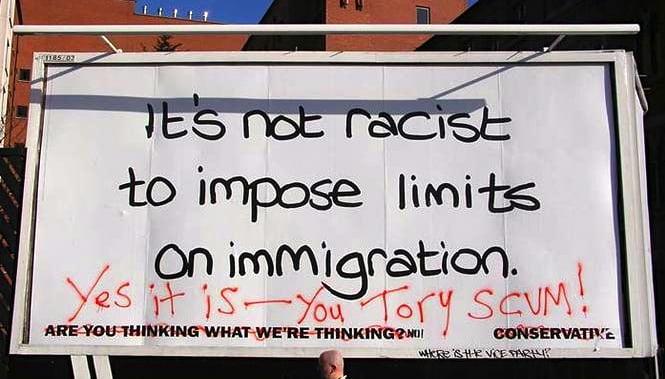 When you wake up to hear that the Archbishop of Canterbury is the lead item on the morning news, then you feel something has either gone very right or something has gone very wrong. That’s what I felt last Friday, and the comments that prompted the headlines were in Justin Welby’s interview with Parliament’s The House magazine.
When you wake up to hear that the Archbishop of Canterbury is the lead item on the morning news, then you feel something has either gone very right or something has gone very wrong. That’s what I felt last Friday, and the comments that prompted the headlines were in Justin Welby’s interview with Parliament’s The House magazine.
“There is a tendency to say ‘those people are racist’, which is just outrageous, absolutely outrageous,” he says. “Fear is a valid emotion at a time of such colossal crisis. This is one of the greatest movements of people in human history. Just enormous. And to be anxious about that is very reasonable.”
There were two instant (and predictable) reactions. One was to say (with Giles Fraser) ‘But much of the fear of migrants really is racist, archbishop’, offering the kind of blanket suppression of thinking about the serious issues involved that Welby was appealing for. (It also [wilfully?] misreads what he said: he was not referring to the fear of migrants but to fear of the effects of migration.)
The other was to blame Welby and his PR team for incompetence.
He and his staff were naive at best if they didn’t realise that parts of what he said could (and therefore would) be picked up by the usual suspects as some sort of justification for their repellent attitudes.
This raises the interesting question of whether I am responsible for people taking my words out of context, misreading them and making headlines of them. (This is an especially interesting question in relation to the Bible: is God responsible for the way people misread the Scriptures?) Of course, anyone in the public sphere needs to consider that all comments are capable of misinterpretation, and we need to avoid giving hostages to fortune. But I wonder what we could say if everything must be couched in terms that could never be misinterpreted? I’m not sure we could say much.
The Economist’s religion and culture blog Erasmus did highlight the unusual nature of the comments; fear is most often something that Christians (and other religions) says we should be free from, except the fear of God. “Fear Him [God] ye saints, and you will then have nothing else to fear…” And yet there is a palpable sense of fear and uncertainty within the communities most directly affected by migration, and these are often communities that Government leaders are not part of (Shadow Chancellor John McDonnell is a refreshing exception to this). Here is one person’s experience:
I live in an inner city area where there is a drastic shortage of quality housing and school places. We have a large Muslim community who live in a parallel world from everyone else and a thriving criminal fraternity from east european countries. These issues create concern and fear and, I must say, that fear extends to the immigrant community who have been here for years. Ironic, I know, but its a fact.
Another of the ironies of migration is that politicians often talk aspirationally of migrant communities (of each era) integrating with the indigenous population, but all the evidence is that they do not—at least for a long time—and in fact that they should not. Research shows that immigrant communities, coming for whatever reason, make the transition to their new context much better if they are in significant sized groups so that they can help and support one another during the period of change—and preserve their own cultural identity and values.
Welby himself highlights the issue of pressure on resources at a local level, and the Express picks up on this.
With housing waiting lists longer than ever, too few school places, queues out of the GP surgery door and hospitals at breaking point, there are legitimate concerns that our relatively tiny island will not be able to cope with a further influx of displaced people.
From a purely analytical point of view, this raises the question of emigration and net migration; if all EU citizens living in the UK returned to their own countries tomorrow, and in turn all UK citizens living in other countries in the EU returned here, what would be the net effect? The official figures suggest that this would balance out, since there are apparently just under 2 million of each. But, rather shockingly, the official figures are almost certainly wrong.
But the challenging counterpoint to that welcome is in the insistence in the OT that the ‘resident alien’ adopt the culture and values of the people of God with whom they are sojourning. In the archetypal story of the refugee’s journey, the book of Ruth, one of Naomi’s daughters-in-law Orpah returns to her native country, but the other, Ruth, travels with Naomi making this declaration ‘Where you go I will go, and where you stay I will stay. Your people will be my people and your God my God’ (Ruth 1.16). In the NT, Paul’s theology is one of radical hospitality to the Gentiles—the grace of God to his people the Jews now overflows to the whole world. Yet the demands of this inclusion are fairly stringent, and the welcome involves leaving behind key aspects of ‘what some of you were’ (1 Cor 6.11) and an adoption of key elements of Jewish culture and ethics.
This does not offer any simple corrective to issues of migration—after all (despite what you might read in some tabloids or on certain blogs) the UK is not the Chosen People, and our values don’t align with the teachings of the Bible in manner of an ancient theocracy. But it does highlight the issue underlying many others—that when people move, they bring with them cultures and values, and so migration is never a value-neutral exercise.
In particular, the EU’s commitment to ‘the free movement of people’ as part of the ‘free movement of business and services’ is making a specific value judgement. It appears to be treating people as not much more than units of production, and assuming that any differences of culture can be held within overarching European shared cultural values. I cannot help thinking that it is this, more than anything else, which needs questioning—and answering it might unlock a more compassionate response to those who are the real ones in need of a migrant’s welcome.
Follow me on Twitter @psephizo
Much of my work is done on a freelance basis. If you have valued this post, would you consider donating £1.20 a month to support the production of this blog?


